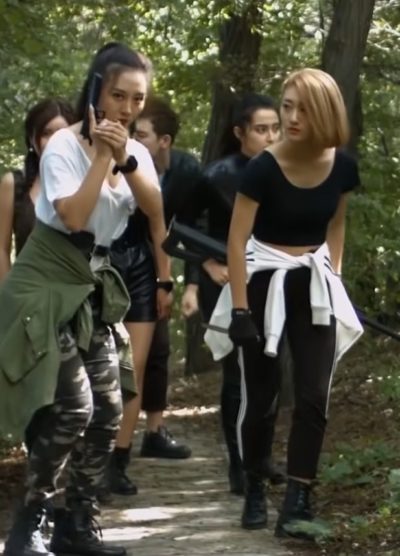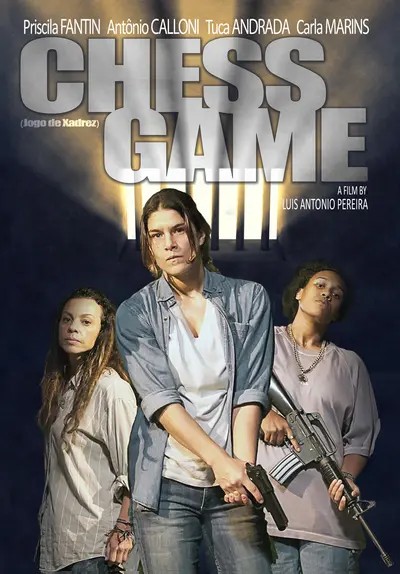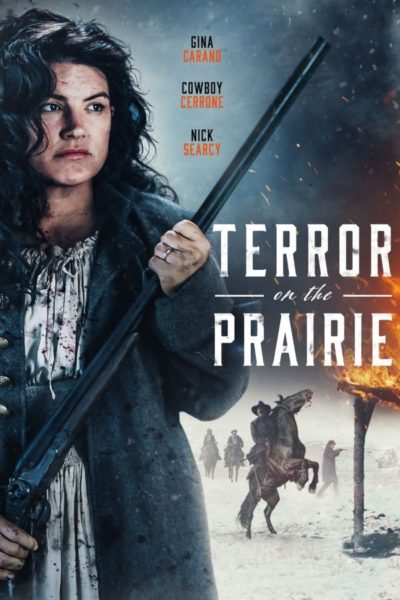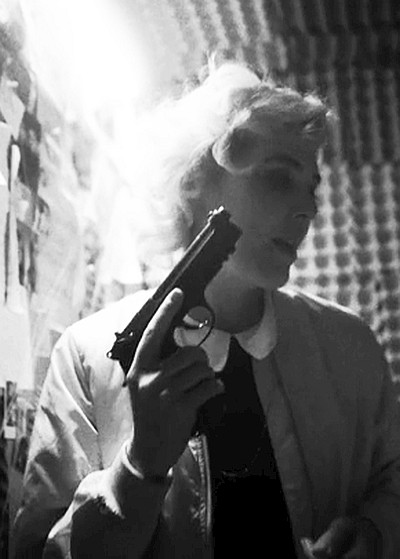★★
“No-one is innocent”
 Paramedic Melina (Sila) regains consciousness to find herself in the back of her ambulance, along with her patient, Franson (Loranger), and the rest of the crew in various states of health. The vehicle had gone off the road and fallen into a ravine, along with the accompanying police car. It turns out they were transporting Franson and another prisoner to hospital when the crash took place – and it quickly becomes apparent that what happened was far from an accident. A posse of camo-clad hunters close in on them, led by Caine (Gray). Their mission to make all the vehicle’s occupants, both criminal and otherwise, pay for the sins of their pasts. They’ve brought with them the wronged parties in question, to exact bloody revenge.
Paramedic Melina (Sila) regains consciousness to find herself in the back of her ambulance, along with her patient, Franson (Loranger), and the rest of the crew in various states of health. The vehicle had gone off the road and fallen into a ravine, along with the accompanying police car. It turns out they were transporting Franson and another prisoner to hospital when the crash took place – and it quickly becomes apparent that what happened was far from an accident. A posse of camo-clad hunters close in on them, led by Caine (Gray). Their mission to make all the vehicle’s occupants, both criminal and otherwise, pay for the sins of their pasts. They’ve brought with them the wronged parties in question, to exact bloody revenge.
An interesting idea, undone by a script which never manages to address basic questions, and which relies too much on ridiculous coincidence, necessary so that the film can happen. I mean, what are the odds of every person taking part in the convoy having a lethal secret hidden in their past, for which they escaped justice? I also am impressed with the organizational skills shown by the ghillie-suit wearing vigilantes. We can’t even get half our family to commit to a birthday party venue, never mind everyone trekking out to the middle of nowhere to take vengeance. Then there’s Melina’s concussion, which appears to have no impact at all five minutes later. On the other hand, she miraculously goes from needing to have explained to her, that a gun will stop someone “doing bad things,” to being a thoroughly competent operator of firearms.
The enemy outside are, initially somewhat menacing, at least when they are in stealth mode. Probably inevitably, given the nature of the plot, they eventually switch into unnecessarily verbose, with Caine the biggest culprit in the category of verbal oversharing. [I’m still trying to work out what the “quick and painful” death he orders at one point would be like: surely it’s one or the other?] I did enjoy some messy and vindictive violence, executed in gratifyingly practical ways. For example meted out by a chainsaw, or a shotgun, first to the groin, then to the face. The ending is admirably bleak, if not unexpected – and, again, relies on remarkable happenstance.
Sila does show some promise, and I liked how nothing much is particularly made about her character’s native American heritage. Such normality is exactly how it should be. Melina has a personable nature, and operates in a common-sense way, refusing to panic despite the increasingly bizarre and threatening situation in which she finds herself. There’s hints that unleashing Franson might be the only way to counter their attackers; this might have merited further discussion, though from this site’s point of view, we are happier to let Melina be her own saviour. We would also have been happier to have seen her part of a totally different script: oh, well, maybe next time.
Dir: Christopher Donaldson
Star: Marika Sila, Kris Loranger, Mackenzie Gray, Lee Lopez





 I have seen bad movies before. I have seen Chinese movies before. But I have never before seen such a bad Chinese movie. Really, their action films are usually at least somewhat competent: even the dreadful work of the notorious Godfrey Ho usually had something of… well, interest, if not perhaps quality to offer. This, however? Utterly appalling, with close to no redeeming features. One anecdote should give you some idea of what I mean. When our daughter was 12, she and her little friend borrowed the camcorder and made a 10-minute action movie, mostly taking place in the garage. I am 100% serious when I say it had significantly better fight choreography than this, and the other elements which go into the film are of little if any higher standard.
I have seen bad movies before. I have seen Chinese movies before. But I have never before seen such a bad Chinese movie. Really, their action films are usually at least somewhat competent: even the dreadful work of the notorious Godfrey Ho usually had something of… well, interest, if not perhaps quality to offer. This, however? Utterly appalling, with close to no redeeming features. One anecdote should give you some idea of what I mean. When our daughter was 12, she and her little friend borrowed the camcorder and made a 10-minute action movie, mostly taking place in the garage. I am 100% serious when I say it had significantly better fight choreography than this, and the other elements which go into the film are of little if any higher standard. This opens with a scene that is almost a direct life from the similarly titled
This opens with a scene that is almost a direct life from the similarly titled  Chinese kung-fu movies took off in the early eighties, after the success of Shaolin Temple, starring an unknown teenager called Jet Li. Over the years that followed, a slew of imitators followed, with varying success. Where these largely differed from their Hong Kong counterparts, were in a more grounded approach to combat: wire-work and trampolines were avoided, in favour of players who (like Li) were martial artists first, and actors second. I believe the same is true of the heroine here, though information about Lin is hard to come by. According to the IMDb, this was her acting debut, though it’s tricky to grade her work there, thanks to the rather clunky dubbing on the print viewed for this review.
Chinese kung-fu movies took off in the early eighties, after the success of Shaolin Temple, starring an unknown teenager called Jet Li. Over the years that followed, a slew of imitators followed, with varying success. Where these largely differed from their Hong Kong counterparts, were in a more grounded approach to combat: wire-work and trampolines were avoided, in favour of players who (like Li) were martial artists first, and actors second. I believe the same is true of the heroine here, though information about Lin is hard to come by. According to the IMDb, this was her acting debut, though it’s tricky to grade her work there, thanks to the rather clunky dubbing on the print viewed for this review. Not to be confused with the 2022 rape-revenge film of the same name (which I’ll get round to reviewing down the pipe), this is somewhat lighter in tone, though there’s a case to be made that this clashes terribly with the subject matter. Jenny (Hsu) is a journalist, working under Cheryl (Garofalo),and her work has brought her to the attention of an online stalker, who sends her increasingly disturbed and disturbing emails. When the harassment begins to move from the cyberworld into the real one, and the authorities fail even to reach the level of disinterest, Jenny teams up with room-mate Lisa (Morales), to hunt down the perpetrator and bring him to justice themselves.
Not to be confused with the 2022 rape-revenge film of the same name (which I’ll get round to reviewing down the pipe), this is somewhat lighter in tone, though there’s a case to be made that this clashes terribly with the subject matter. Jenny (Hsu) is a journalist, working under Cheryl (Garofalo),and her work has brought her to the attention of an online stalker, who sends her increasingly disturbed and disturbing emails. When the harassment begins to move from the cyberworld into the real one, and the authorities fail even to reach the level of disinterest, Jenny teams up with room-mate Lisa (Morales), to hunt down the perpetrator and bring him to justice themselves. I had to work quite hard to see this: while it is on Tubi, the subtitles there were only in Spanish, and so not much help (I’m still at the “Donde esta la biblioteca?” level). Fortunately, it then turned up on Vudu, and I bravely made my way through their crappy interface and frequent adverts to bring you this review. It was worth it. This is a solid slice of women-in-prison action/drama from Brazil, though perhaps less exploitative than I expected (especially given the country’s history in the sub-genre!) . I mean, Marins is a former model in Brazillian Playboy, so you’ll understand I had… certain expectations. Fortunately, the rest of the movie proved more than adequate to hold my attention.
I had to work quite hard to see this: while it is on Tubi, the subtitles there were only in Spanish, and so not much help (I’m still at the “Donde esta la biblioteca?” level). Fortunately, it then turned up on Vudu, and I bravely made my way through their crappy interface and frequent adverts to bring you this review. It was worth it. This is a solid slice of women-in-prison action/drama from Brazil, though perhaps less exploitative than I expected (especially given the country’s history in the sub-genre!) . I mean, Marins is a former model in Brazillian Playboy, so you’ll understand I had… certain expectations. Fortunately, the rest of the movie proved more than adequate to hold my attention.  I’d been aware of this movie for some time, through its innovative crowd-funding approach, which raised $3 million to cover the cost of production. After COVID hit, there were doubts it’d ever see the light of day, but here it is: the first “Swissploitation” film [If not quite the case, it’s certainly the first one with a seven-figure budget, as well as the first Swiss movie covered on this site] And it’s not bad: if you’re familiar with similarly crowd-funded spoof, Iron Sky, this is along similar lines of broad parody. It covers almost every genre of cult from kung-fu films through Starship Troopers to women-in-prison films, e.g. there’s an Asian prisoner
I’d been aware of this movie for some time, through its innovative crowd-funding approach, which raised $3 million to cover the cost of production. After COVID hit, there were doubts it’d ever see the light of day, but here it is: the first “Swissploitation” film [If not quite the case, it’s certainly the first one with a seven-figure budget, as well as the first Swiss movie covered on this site] And it’s not bad: if you’re familiar with similarly crowd-funded spoof, Iron Sky, this is along similar lines of broad parody. It covers almost every genre of cult from kung-fu films through Starship Troopers to women-in-prison films, e.g. there’s an Asian prisoner  I keep hoping Carano will deliver an action film reaching the quality of her debut,
I keep hoping Carano will deliver an action film reaching the quality of her debut,  The first eighty or so minutes of this are really good: powerful, committed and extremely angry film-making. And justifiably so, I would say. Unfortunately, the film runs for a hundred and seventeen minutes, and definitely goes off the rails towards the end. The gritty realism which was perhaps the movie’s strongest suit is replaced by odd fantasy sequences, such as the fugitive couple suddenly dressed, in the middle of a forest, as if they were attending a Victorian embassy ball. I’m not certain what the point of these elements, or the anachronistic pop songs were. I am certain that they didn’t enhance my appreciation of the film in any way, and that’s a shame, considering how assured it had been in the early going.
The first eighty or so minutes of this are really good: powerful, committed and extremely angry film-making. And justifiably so, I would say. Unfortunately, the film runs for a hundred and seventeen minutes, and definitely goes off the rails towards the end. The gritty realism which was perhaps the movie’s strongest suit is replaced by odd fantasy sequences, such as the fugitive couple suddenly dressed, in the middle of a forest, as if they were attending a Victorian embassy ball. I’m not certain what the point of these elements, or the anachronistic pop songs were. I am certain that they didn’t enhance my appreciation of the film in any way, and that’s a shame, considering how assured it had been in the early going.
 I did not originally expect to be reviewing this here. I watched it because of the technical elements, which I’ll get to in a bit. However, by the end, it does qualify – though you certainly wouldn’t think so from how things begin. It gets underway with Lili (Puig) waiting for a date arranged over the Internet with Eduardo (Alcantara). He shows up late, very apologetic after having been mugged, and having had his phone taken, but is utterly charming, and the chemistry with Lili is immediate. They end up back at his place for dinner. But as he’s cooking on the kitchen, the tone of the evening changes, when she hears his supposedly stolen phone going off in his jacket…
I did not originally expect to be reviewing this here. I watched it because of the technical elements, which I’ll get to in a bit. However, by the end, it does qualify – though you certainly wouldn’t think so from how things begin. It gets underway with Lili (Puig) waiting for a date arranged over the Internet with Eduardo (Alcantara). He shows up late, very apologetic after having been mugged, and having had his phone taken, but is utterly charming, and the chemistry with Lili is immediate. They end up back at his place for dinner. But as he’s cooking on the kitchen, the tone of the evening changes, when she hears his supposedly stolen phone going off in his jacket…